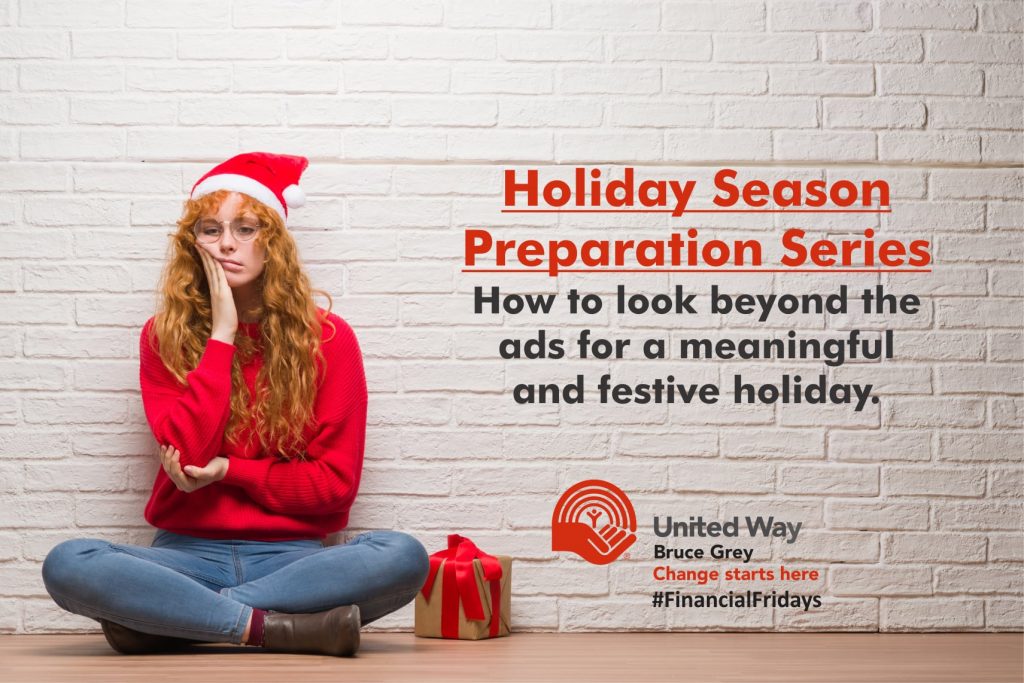#FinancialFridays: Being objective around holiday advertising.

Our finances are closely linked to our health, including our mental health. When we are confident about our financial situation and have enough to cover our basic needs with extra at the end of the month, we may be able to feel secure and plan for the future. The opposite is also true… and more common. A lack of money can mean significant stress, concern, and an inability to plan for the short term, let alone the long term. Many people feel added pressure to give their families more than they can afford.
We are surrounded and inundated with messages that we NEED the newest, brightest, best products… and the accessories to go along with it. Christmas and holidays can be specifically difficult times to deal with financial concerns and pressure to purchase, purchase, purchase. Add COVID-19 and, I don’t know about you, but I feel overwhelmed.
This week we are going to speak about the techniques advertisers use to sell us goods and services. This is meant to help you look more objectively at the messages you are getting from all around you and navigate the impact these techniques have on all of us.
Imagine a picture of a family sitting outside of a large house having an elaborate picnic, dressed beautifully, smiling and laughing. What is this advertising selling you? There are a multitude of products it could be selling; the product doesn’t even have to be shown. What they are inferring is if you buy the product, you can have this lifestyle! Lifestyle sales is a technique advertisers use to influence you to buy their product.
Here is a list of advertising techniques:
• Lifestyle sales are selling the lifestyle shown in the ad. They lead us to believe that if we buy the product, we can have a similar lifestyle.
• Sex appeal – Ads with sexy looking men or women send the message that we too will be sexy if we buy the product. Sometimes it can be hard to tell what product these ads are selling and the product may not even appear in the ad.
• Special deals – These ‘limited time offers’ may also include coupons or discount codes. However, they might not be deals at all. To find real deals, it is important to shop around and compare prices. We cannot rely on the claims that an ad makes.
• Star power – These are ads that use celebrities to sell their product. They’re also known as ‘celebrity endorsements.’ Famous people are paid a lot of money to appear in these ads. The hope is that if we like and trust the celebrity, we will buy the product they endorse. Many celebrities never use the products they promote.
• Science and statistics – Is there a doctor or scientist in the ad? Often these ‘experts’ are paid actors or models. Does the ad use numbers and percentages, or make claims about research? These statistics might only be part of the whole story. The ‘science’ was most likely funded by the company, and they might not be based on real science. Always look for the ‘fine print’ in an ad like this.
• Better than – These ads claim that their product is better than their competitors. These ads rarely say how or why their product is better, other than that people – most likely actors – like it more.
• “Weasel” words – Advertisers are not allowed to outright lie, but they do twist words around and use misleading language. When an ad for a sugary cereal tells us that it is ‘part of a healthy breakfast’, they are not telling you about the other healthier parts of the breakfast, like the fruit! Certain words and terms have become so overused they lack meaning. For instance, there are so many ‘green’ products – just what do they mean by ‘green’?
• Put downs – Ads sometimes try to make us feel bad and then try to sell us something. They tell us we are too fat, too old, too dull, that our house is too dirty, our car is too old. They want to sell us a product that will improve our lives – but will it?
• ‘Bandwagon’ appeal – We have a basic need to feel we belong. Bandwagon appeal ads tell us that if we don’t buy something, we will be left out. These ads often target children and teens who have a very strong need to belong in the peer group. Advertisers are very media aware of young people as one of their target markets.
When you hear or see an ad, ask yourself what techniques the advertiser is using. This will help you distance yourself from the influences of the ad. This can also be an opportunity to teach the children and others in your life about the power of advertising. Make it a game! This can help us all feel more in control of our purchasing choices which gives us more power over our spending.
If you are feeling overwhelmed, please call or text 211 to find local mental health services in your area.

